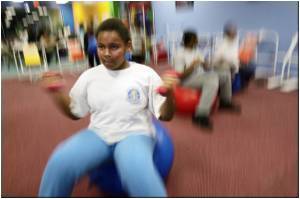Physical exercises are known to help reduce weight by burning calories. Now it turns out that they can increase cellular metabolism in such way that calories are burnt even when one is at rest.

can increase cellular metabolism in such way that calories are burnt even when one is at rest. A study by Associate Professor Frank Seebacher and PhD student Elsa Glanville from the School of Biological Sciences in the University of Sydney found that even low levels of physical activity - such as a daily brisk walk for 30 minutes - is necessary to turn on the right molecular switches so that cells can metabolise and burn energy effectively.
First author of the study, Associate Professor Seebacher said the bodies of mammals, including humans, were designed to be exercising regularly.
"Our research using a mammal model shows a sedentary lifestyle is doubly bad and may lead to weight gain because energy is not used up by muscular activity and metabolic signalling is disrupted, which reduces the body's ability to burn energy," he said.
In humans and other mammals, the metabolism of a resting body will increase as ambient temperatures decrease below 30 to 35 degrees Celsius. This means that resting bodies will burn more energy at cooler conditions, below 30 degrees Celsius. Most people and animals will experience temperatures well below this level most of the time, so in theory, our bodies should be stimulated to burn energy at everyday "cold" temperatures.
However, the results of the study, showed in tests using wild native Australian bush rats (Rattus fuscipes) that cold conditions did stimulate a rise in metabolism - but not in the absence of exercise.
"Rats that had exercised for half an hour a day did show a metabolic response to cold, and burnt more energy as expected," Associate Professor Seebacher said.
Advertisement
He said this research - the first of its kind to show the interaction between exercise and temperature on cellular metabolism - shows that physical activity has a subtle effect on our body's energy expenditure by opening up a number of cryptic genes that control the rate of cellular metabolism.
Advertisement
The findings have been published in Public Library of Science ONE (PLoS ONE).
Source-Medindia













